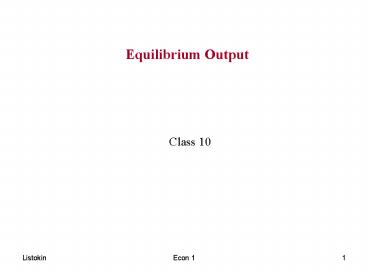Equilibrium Output PowerPoint PPT Presentation
1 / 21
Title: Equilibrium Output
1
Equilibrium Output
- Class 10
2
We know the components of output. What
determines the level of output?
- Equilibrium Output
- GDPCIG(Ex-Im)
- Lets ignore net exports for the moment (recall,
they dont account for much -wise) - Lets ignore government, too (for simplicity)
- GDPCI
- The consumption/income schedule determines output
- Shows the amount of desired consumption at
different levels of national output
3
In a given period, households use part of their
income for consumptions and part on saving
- Income, Consumption, Saving Patterns
- Families with higher incomes tend to have higher
consumption expenditures - Higher-income families tend to save a larger
portion of their disposable income than do
lower-income families - Higher-income families spend a smaller portion of
disposable income on food than do lower-income
families - Income Consumption Savings
- Y C S
4
(No Transcript)
5
The marginal propensity to consume is the
fraction of additional income that is spent on
consumption
- MPC
- Extra consumption induced by another dollar of
disposable income
6
Marginal Propensity to Save is the fraction of
the increased in income that is saved
- MPS
- Change in desired saving that is brought about by
a change in income of 1 - Can be completely derived from MPC
- MPC MPS 1
7
Dissaving
8
Income is not the only determinant of consumption
- Nonincome Factors that Affect Consumption
- When income changes, we have a movement along the
consumption/income curve - There is a shift in the consumption curve when
something other than income changes - Expectations
- Stock of Assets
- Purchasing Power
- Taxation
- Attitudes
9
Now, lets add investment (I)
- Assumption The amount of desired investment is
fixed - No Gov, No International Trade
10
Desired Decisions are not necessarily realized
- Title
- Bullets
45 degree line
CI
C
11
Equilibrium occurs when the economy produces an
output that equals desired aggregate expenditures
- Equilibrium
- Aggregate Output Y
- Aggregate Expenditure C I
- Y C I
- S I
12
Now, we can start to build the downward sloping
AD curve
AE (at p)
AE (at p)
- AD Curve
- Recall, as prices fall, purchasing power for
every given level of income goes up - Consumption for every level of income goes up
Expenditures
y
y
p
Price Level
p
AD
y
y
Income
13
What happens to the income/expenditure
equilibrium when desired aggregate expenditures
change?
- Autonomous Expenditures
- We are talking only about what happens when
autonomous expenditures change - Expenditures that shift the level of desired
aggregate expenditures - Independent of income changes
- Changes in government spending
- Changes in investment
- Changing attitudes towards thrift
- Changing expectations
14
Lets say there is a change in planned investment
spending
15
Example 50 billion increase in investment
450
400
400
600
16
A 50 billion increase in investment spending
causes a 200 billion increase in output (from
400 billion to 600 billion)
- Expenditure Multiplier Effect
- Ration of the change in output to the change in
autonomous expenditures - Investment Multiplier
- In this case 200/50 4
17
Why would the investment multiplier be greater
than one?
- Multiplier Effects
- If investment increases by 50 billion
- Income increases by 50 billion
- Some of the new income will be saved, some will
be consumed - MPC 50 billion will be consumed
- 0.75 50 billion 37.5 billion
- Income increases by 37.5 billion
- Some of the new income will be saved, some will
be consumed - MPC 37.5 billion will be consumed
- 0.75 37.5 billion 28 billion
18
Algebraically
19
The multiplier has implications for output
instability
- The Theory of Investment
- If investment spending is highly unstable, the
multiplier would magnify this instability - Is there a role for government to stabilize
spending?
20
Another example
- Calculate the saving/income schedule
- Determine the MPC and MPS
- Determine at what level of income the break-even
point of zerp saving is reached - Determine the aggregate expenditure schedule if
investment is constant at 50 - Find equilibrium output. What is investment and
saving at this point? - What happens to equilibrium output if investment
falls to zero? - What is the investment multiplier?
21
Next Class
- Optional stock market class tomorrow
- Fiscal and Monetary Policy

